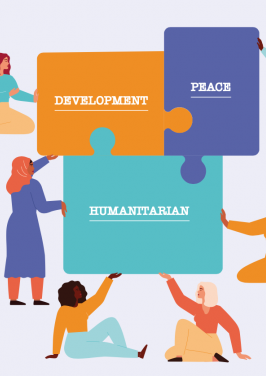Leading the Way: The Nexus through a Feminist Lens
ActionAid UK’s report brings together the experiences of women’s rights and women-led organisations in the Global South to explore how they are implementing a ‘Nexus approach’ within their communities – as first responders, but also as key actors of change in development and peace-building activities.
It looks at why the international community must invest in local women-led interventions and shift power, decision making and funding to women’s rights and women-led organisations, which are best placed to understand emergency needs.
Executive summary
The Nexus has been coined as a term to describe the interaction between humanitarian aid, development and peacebuilding efforts and how work in these three areas is undertaken by different actors.
Even though in recent years, humanitarian action has largely adopted a more nuanced approach that takes into consideration concepts of preparedness, long-term sustainability and recovery, this is not consistently happening in practice. The international community still struggles with how to operationalise the Nexus, despite recognition that actors working in humanitarian aid, development and peacebuilding efforts have surpassed the traditional lines of what they constitute either as ‘response’, ‘development’ or ‘peace’ activities.
Most of these conversations have been framed by the viewpoints and experiences of donors and humanitarian agencies, rather than the views and experiences of local actors, specifically women’s rights and women-led organisations (WROs and WLOs), who are central to humanitarian responses, and directly impacted by such decisions. While international NGOs, UN agencies and donors have been slow to adopt this approach, WROs and WLOs at the forefront of humanitarian emergencies have been transcending these divides within their responses, despite this not being acknowledged.
ActionAid has undertaken research to fill this gap and bring new insights to the rhetoric, by drawing on the experiences of women and their organisations working across the Nexus to lead responses to emergencies in Haiti, Lebanon, Myanmar and Somaliland to examine how they work across the Nexus, and what these siloes mean to them. Within each context, they interrogated why inequalities occur, exploring the synergies between their work within humanitarian, development, and peacebuilding activities, often working without labels.
